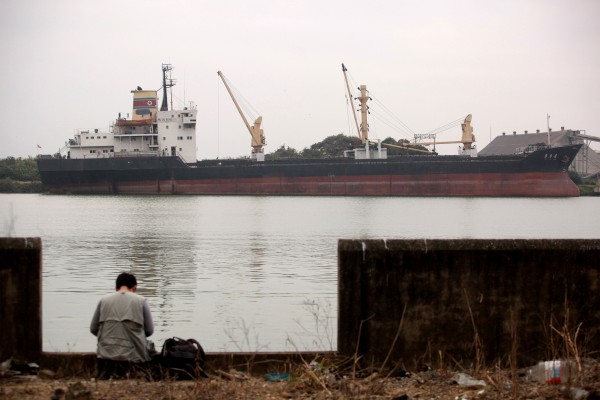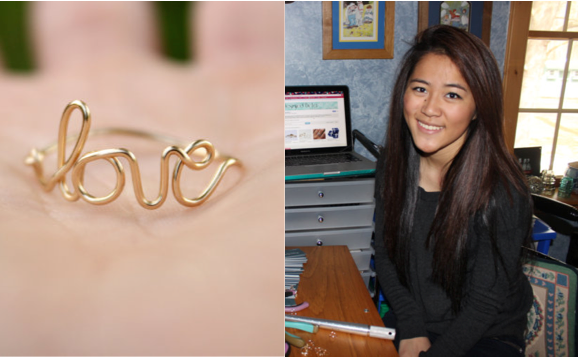In this April 9, 2015 photo, a journalist sits near the North Korean cargo ship Mu Du Bong, anchored in the port of Tuxpan, Mexico, after it accidentally ran aground off Mexico in July 2014. Despite North Korea’s protests, a panel of experts that monitors U.N. sanctions against Pyongyang for its nuclear and missile programs asked the Mexican government not to release the boat. North Korean diplomats have said the ship was carrying nothing prohibited by sanctions. (Photo courtesy of Felix Marquez/AP Photo)
by CARA ANNA, Associated Press
UNITED NATIONS (AP) — Winning a lawsuit against North Korea is rare. Collecting millions of dollars in damages from the isolated country? Pretty much impossible. But an Israel-based civil rights group thinks it has found a way, starting with a North Korean ship that’s been held, against Pyongyang’s wishes, in a Mexican port for the past year.
The effort illustrates the challenges of holding North Korea to account in more ways than one.
The Shurat HaDin law center began its pursuit after winning a $330 million U.S. District Court judgment in April over the abduction of a South Korean-born pastor in China and his presumed torture and killing in North Korea 15 years ago. Now the center is aiming for whatever North Korean assets it can find.
It has focused on the Mu Du Bong, a cargo ship that accidentally ran aground off Mexico last July. Despite NorthKorea’s protests, a panel of experts that monitors U.N. sanctions against Pyongyang for its nuclear and missile programs asked the Mexican government not to release it.
The ship’s North Korean parent company, Ocean Maritime Management Co., has been under sanctions ever since another ship it operated was found to be carrying two Cuban fighter jets, missile and live munitions hidden under a cargo of sugar.
Seizing the Mu Du Bong requires that a Mexican court recognize the U.S. court’s judgment. Civil courts in Mexico City and in the state of Veracruz have declined to hear Shurat HaDin’s request, but it is now appealing.
The plan is to sell the ship to the highest bidder, with the money going to the South Korean pastor’s family.
“There are so few North Korean assets around the world that an opportunity like this, to seize the boat, should not be allowed to simply slip away out of fear of North Korea or other political consideration,” Nitsana Darshan-Leitner, Shurat HaDin’s director, told The Associated Press on Tuesday.
Shurat HaDin is known for suing states such as Iran and Syria on behalf of victims of torture or terrorism, aiming for bad publicity for those governments even if it can’t get them to pay.
North Korea has never admitted the abduction and torture of the pastor, U.S. resident Kim Dong Shik. Pyongyang has been known to respond harshly to people who try to promote religion, even among the thousands of North Koreans who have fled to neighboring China.
Normally, foreign states can’t be sued in the United States, but an exception in the Foreign Sovereign Immunities Act allows it against countries that are listed as state sponsors of terrorism. Shurat HaDin filed suit over Kim’s disappearance just one day before the George W. Bush administration removed North Korea from that list.
The removal has complicated efforts to collect damages from Pyongyang, including by accessing the millions of dollars of its money still thought to be frozen in several U.S. banks. As of 2008, the last year the U.S. Treasury reported it, $34 million of North Korean money remained in U.S. banks. A Treasury spokeswoman didn’t comment.
Even if a suit is won, collecting money from Pyongyang is extremely difficult.
In 2010, Shurat HaDin won $378 million in a U.S. court against North Korea over the killing of Americans at an Israeli airport in 1972, but it was unable to collect.
In 2008, attorney Richard Streeter received a $65 million judgment on behalf of U.S. Navy crewmen held captive for nearly a year by North Korea in 1968. The former crewmen have never collected any money.
“Let me know if they get anything,” Streeter said of the latest case.
Pursuing assets is often hampered by the U.S. government because of real or perceived conflicts with its political goals, said Jeffrey Addicott, director of the Center for Terrorism Law at St. Mary’s University. “If a nation does something adverse to another nation, the fear is that the harmed nation may retaliate in a way that produces a great deal of mischief,” he said in an email. “Particularly true when dealing with totalitarian states.”
There has been no comment on the attempt to seize the cargo ship from North Korea’s mission to the U.N., which has said Mexico “forcibly detained” it under U.S. pressure. North Korean diplomats have said the ship was carrying nothing prohibited by sanctions.
The head of the U.N. panel of experts, Hugh Griffiths, did not comment. But a former panel member, former U.S. official William Newcomb, said U.N. permission isn’t needed for Mexico to allow Shurat HaDin to seize the ship.
“I think the Security Council will be happy if the ship does not go back to North Korean hands,” Mexican lawyer Alberto Mansur, who has helped with the court filing, told the AP.
___
Copyright 2015 The Associated Press. All rights reserved. This material may not be published, broadcast, rewritten or redistributed.







